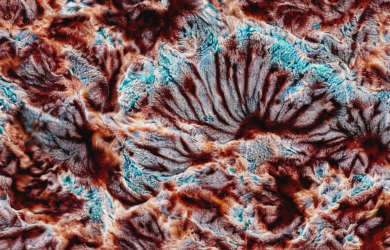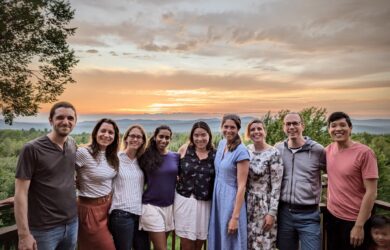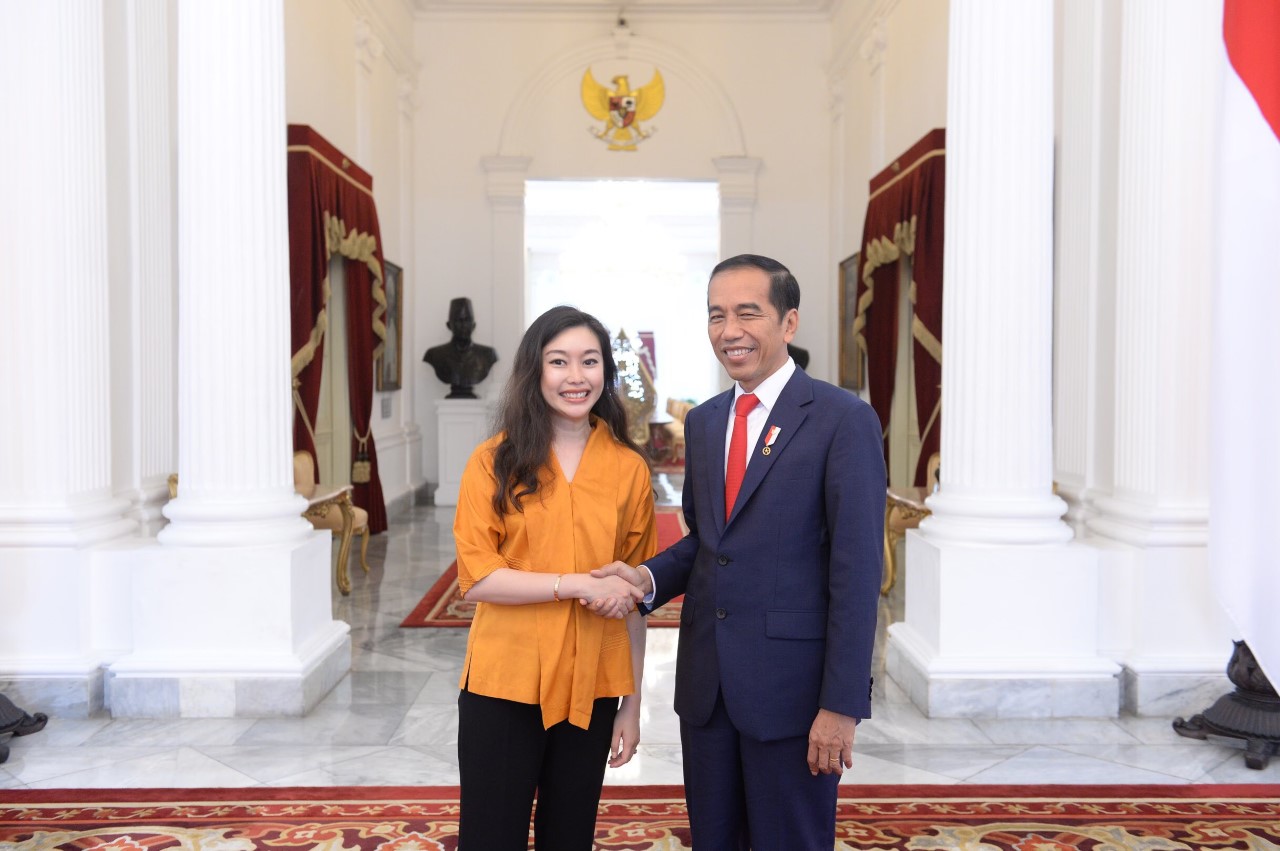
Sabrina Anjara met the President of Indonesia on Monday to discuss the role of the Indonesian diaspora in economic development.
A Gates Cambridge Scholar met with the President of Indonesia this week to discuss the role of Indonesian diaspora in building the country.
Dr Sabrina Anjara [2014] had an audience with the President of Indonesia, HE Joko Widodo, at the Presidential Palace in Jakarta on Monday.
The President received a group of 35 representatives of the “Inovator 4.0” network led by a University of Cambridge alumnus, Senator Budiman Sudjatmiko. The group presented their solutions to issues in Indonesian healthcare, education, economic growth and sustainable energy through innovative technology and creative investment models. Also attending the meeting were the Minister for Research, Technology and Higher Education and the Cabinet Secretary.
Sabrina was one of seven overseas-based Indonesian scientists who were flown home for the closed meeting during which the President expressed his wishes for the Indonesian diaspora (scholars and professionals living abroad) to contribute to research, innovation and education in Indonesia.
Responding to the discussion, Sabrina highlighted the continued need for a change in mindset towards multiculturalism and tolerance in line with the President’s 2014 “mental revolution” campaign.
Sabrina also briefly mentioned her doctoral research at 28 primary care clinics in Indonesia, funded by various University of Cambridge departments, the British Psychological Society and through crowdfunding. The lack of accessible research funding within Indonesia remains a hindrance to development and innovation, she said.
In her current role as a Postdoctoral Research Fellow in University College Dublin, Sabrina is part of a team awarded an Irish Health Research Board grant to develop a model of integrated care for older people in Ireland. At the meeting, she underlined the fact that her Indonesian citizenship was not an issue for the award. Instead, reviewers praised the diversity of the team and its wealth of collected experience.
Sabrina and another Cambridge alumna, Tracey Harjatanaya, also mentioned their project on promoting inter-religious harmony to the President. They have proposed methods to identify groups and areas at risk of radicalisation using artificial intelligence, followed by online and offline programmes to promote critical thinking and tolerance.
Sabrina also highlighted potential barriers to the career development of recent PhDs who returned home. In 2017, only 11.36% of university lecturers in Indonesia had a PhD. Relatively few have a track record of publishing in international journals. Given the importance of mentorship and supervision for recent PhD graduates who remain in academia and hope to be world-class researchers, those who return home too soon may plateau instead of furthering their network and collaborations, she said.
She believes Indonesians in a similar position should continue their research careers abroad, where funding, infrastructures and academic mentorship are in place, and return home once they reach professional maturity and global competitiveness. She says that doesn’t stop them from conducting Indonesia-relevant research, partnering with Indonesian institutions in multi-country projects and sharing authorship in international journals.
Last month, the Indonesian government appointed members for a National Research Council. Following yesterday’s meeting, it was announced that 6 trillion rupiah in endowment (circa £350 million) would be made available for research and that Indonesian diaspora are also eligible. There are 10 research areas identified: food and agriculture; healthcare; information and communication technology; transportation; defence; renewable energy; maritime; disaster management; society and culture; and education.
Dr Sabrina Anjara did a PhD in Public Health and Primary Care and was the first Indonesian to be awarded the Gates Cambridge Scholarship. Since then, Vincentius Aji Jatikusumo (2015), Muhammad Hartono (2019) and Muhammad Iqbal (2019) have also been awarded a Gates Cambridge Scholarship.
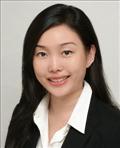
Sabrina Gabrielle Anjara
- Alumni
- Indonesia
- 2014 PhD Public Health and Primary Care
- Queens' College
Sabrina is the first Gates Cambridge Scholar from Indonesia. Her PhD at Cambridge was a cluster randomised controlled trial of the implementation of mental health services in primary care clinics. She completed a Postdoctoral Research Fellowship at University College Dublin, studying how collective leadership in healthcare influences patient outcomes. She is now Research Principal at Accenture’s Human+AI Impact Initiative. Sabrina holds a BA in Psychology and Asian Studies from the University of Melbourne, and an MSc in Organisational Psychiatry and Psychology from King’s College London. Before Cambridge, Sabrina led a study on determinants of success in medical training at the National University of Singapore, using big data, and spent some years as a Psychologist at the Ministry of Social and Family Development, Singapore. She’s a World Economic Forum Global Shaper.
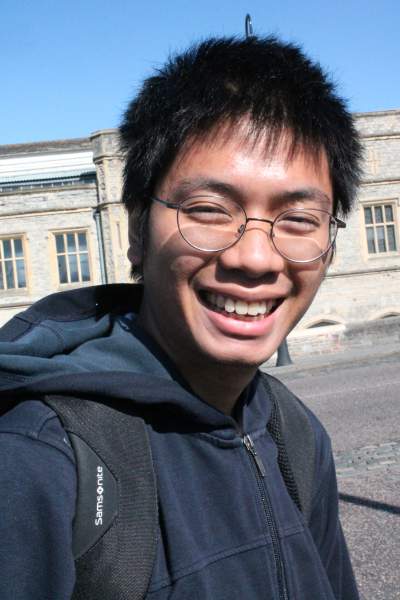
Vincentius Aji Jatikusumo
- Alumni
- Indonesia
- 2015 PhD Biochemistry
- Peterhouse
I am pretty much a journeyman: born in Surabaya, spent my childhood in Madiun, grew up in Batam, completed my high school in Singapore, and studied BSc (Hons) Biomedical Genetics in Newcastle. Along the way, my curiosity for many things has been growing, ever since my parents encouraged me to read a lot: from national newspaper, Tintin series, to literature.During my undergraduate years, I developed strong interest in molecular biology. I was the first Indonesian to be selected by the Amgen Scholars Programme in Cambridge, to pursue a summer research on CRISPR/Cas9 modification. My undergraduate project at Newcastle University, where I managed to define novel interactions between two synaptonemal complex proteins, motivated me even more to embark on a research career.I will work with Dr. Luca Pellegrini at the Department of Biochemistry to investigate the molecular machinery of eukaryotic DNA replication. This may help us to give much-needed details on the fundamental process of genomic duplication and clues on how some genetic diseases arise.I am striving to be a leading scientist who is well-motivated to help the others. My biggest goal is to help my home nation Indonesia. It is a huge country with so many potentials – and I hope to lead and to contribute in the field of medical research.
Previous Education
University of Newcastle Upon Tyne
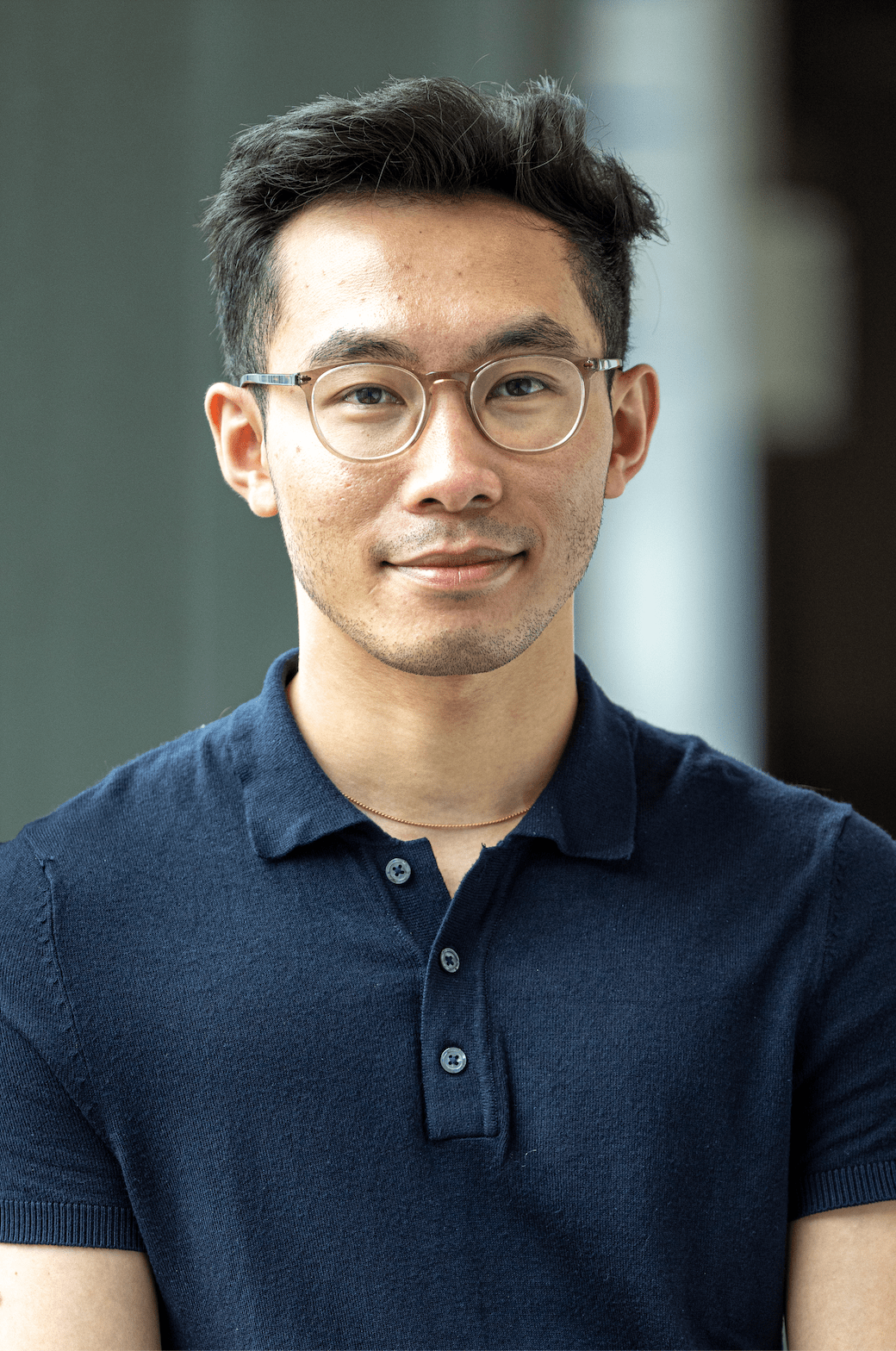
Muhamad Hartono
- Alumni
- Indonesia
- 2019 MPhil Biotechnology
2020 PhD Chemical Engineering - Downing College
My research focuses on developing a novel method to detect cellular senescence after cancer therapy. Senescence, a natural cellular response to damage including chemo- and radiotherapy, has been shown to promote tumour growth and cancer recurrence. Therefore, the ability to detect senescence in cancer after treatments can be helpful to improve the prognosis of cancer treatments. In particular, I am interested in exploring nanomaterials to build a stimuli-responsive detection method capable of reporting senescence burden.
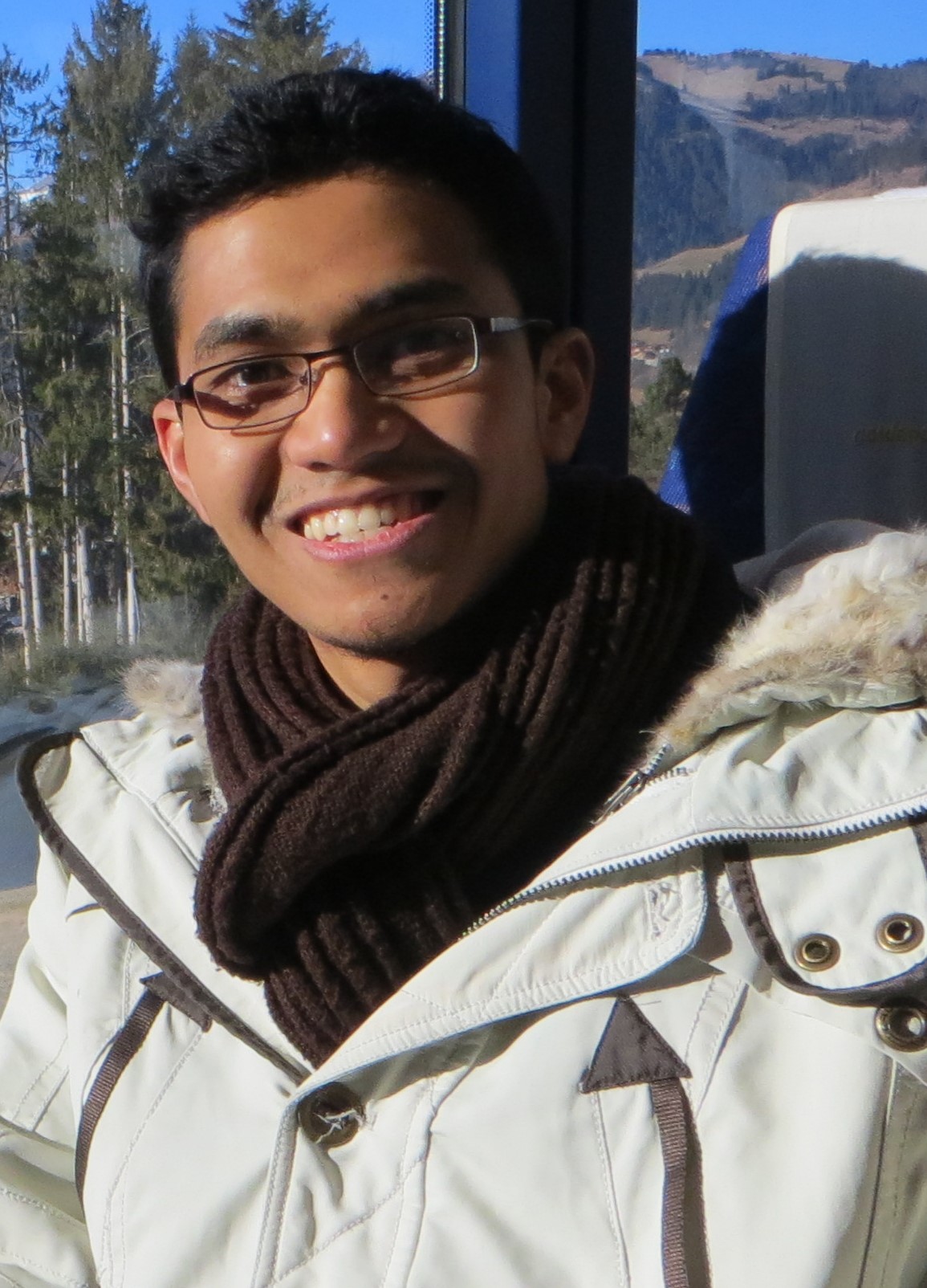
Muhammad Iqbal
- Alumni
- Indonesia
- 2019 PhD Pathology
- Downing College
Since completing school education, I have had a firm intention to become a biomedical researcher who can translate research queries into practical application for the Indonesian people. My journey towards that dream is always challenging, but interesting and full of contemplation at the same time. I have gone through a set of diverse experiences at the past to finally formulate my own direction for this dream; from being a bioengineer that produced a cancer cell-specific inducer of apoptosis from a chicken anaemia virus gene to founding my own start-up company focusing on natural product utilisation for bacterial infections. Now, I am directing my future to become an immunologist that aims at ending the global issue of antibiotic resistance. To this end, I am looking forward to enhancing my skills in research by undertaking a PhD with Prof Okkenhaug & Dr Conway Morris, where I will investigate how we can manipulate the human neutrophil phosphoproteomic response to Staphylococcus aureus and identify potential non-antibiotic therapies for augmenting the host clearance of this crucial pathogen. This degree will be paramount for me to establish biomedical research environment in Indonesia and help developing Indonesian biopharmaceutical industry. Such work will be of relevance to many similar nations, and will help address the global burden of infectious diseases. In my spare time, I love spending time with my family and friends & writing my bioscience blog at iqbalmuhammad.com.










